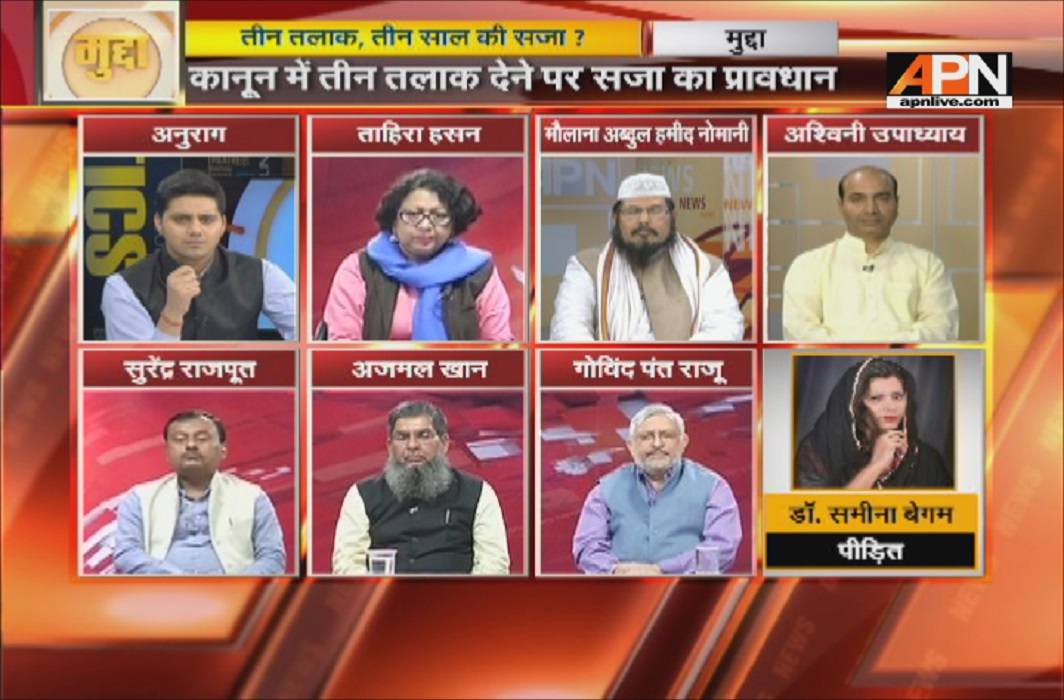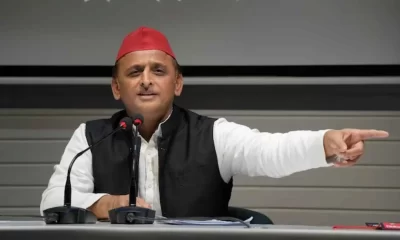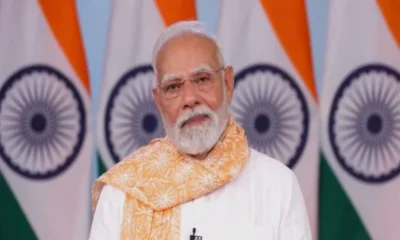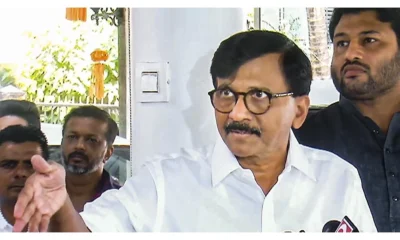[vc_row][vc_column][vc_column_text]Panel explores strands of opinion on the issue, Muslim community leaders pay lip service to social reform even as Congress left red-faced over “missed opportunity”
Marriage, divorce and child custody are in the concurrent list. Coming a little over three months of the Supreme Court verdict outlawing it, the centre’s move to draft a bill to make triple talaq a non-bailable offence punishable by three years in jail and a fine for introduction in the winter session of the parliament has come in for criticism from Muslim leaders who have questioned its timing as suspicious due to its proximity to the Gujarat assembly elections.
On Saturday, APN’s popular debate show Mudda explored the many opinions on this topic. Participants included Maulana Abdul Hameed Momani, national general secretary of AIMIM, Ajmal Khan, advocate, Tahira Hasan, social worker, Govind Pant Raju, journalist, Ashwani Upadhyay, BJP spokesperson, and Surendra Rajput, Congress spokesperson. The show was anchored by Anurag Singh.
Hasan said this has been a long fight. “There was a case even before Shah Bano’s. It is a shame that this practice has been continuing in the world’s largest democracy for such a long time. Punishing the husband is not enough; we must also punish the muftis (clerics) who justify the false divorce. Equally importantly, the new law must also have provisions to ensure the financial security of the woman who is a party in the dispute. It must not stop at child custody but also incorporate inheritance matters,” she said.
“Roomal bhi gir jata hai utthaya jata hai par aurat ko to fnek diya jata hai (even a handkerchief is picked up when it falls to the ground but a woman is thrown away),” she lamented.
The Maulana was, meanwhile, more circumspect. Though he could not deny the rightness of the move for fear of contempt of court, he said that triple talaq should be punishable only if it is instantaneous and unreasonable, adding that 40 per cent of Muslim women were the ones who sought divorce in a marriage while in the remaining 60 per cent of cases, it was the man who initiated it. He also sought to deflect blame from the leaders of the Muslim community saying that both the Sharia Act, 1937, and the Divorce Act, 1939, were formulated and passed by the British government.
The two political spokespersons then entered a heated private debate on why the Congress government in 1986 passed the Muslim Women (Protection of Rights on Divorce) Act, diluting the Supreme Court’s 1985 Shah Bano case judgment. A desperate Rajput was seen accusing Upadhyay of speaking disparagingly of Feroze Gandhi’s Parsi faith with respect to the recent controversy over Congress vice-president Rahul Gandhi’s religious leanings.
Raju, however, held that the Shah Bano case was indeed a missed chance for the Congress as far as social reform is concerned.
Next, when Ajmal Khan raised the issue of Article 25 and called for the protection of minorities, the BJP spokesperson said it referred to only opening of schools and universities and proceeded to question the minority status of the Muslims in light of their population figures, stating that India has the largest Muslim population in the world.
The Maulana insisted that triple talaq was still also a religious issue and held that the ulemas and muftis must have a say in deciding maintenance and child custody, and not only the magistrate as envisaged in the draft law. When upbraided for his regressive stand, he said, “Who’s stopping the government from enacting the uniform civil code? The BJP has been in power at the centre for over nine years now but a draft of the code is still not forthcoming.” He denied the allegation that nikah halala is practised by the muftis.
He said that women’s opinions should be taken into account while making the law. The BJP spokesperson said Muslim men’s opinions, too, mattered and they are not necessarily at odds with the women’s opinions.
Raju said triple talaq was “not a women’s issue but a humanitarian and human rights issue”. He openly called politicians irresponsible and cited that as the reason why it has taken so long to solve the problem. “This is a very positive step and we must keep petty politics aside and wholeheartedly support it,” he said.
Ajmal Khan then changed his tune, saying that since the Supreme Court has already given its verdict on the issue, no consultations are required and the government should just go ahead and make the law. “For, if you talk to A, then B will complain as to why they were not consulted,” he said by way of explanation.
Speaking over the phone line, Dr Shamina Begum, a triple talaq victim, appealed to the audience to not conflate the issue with faith and not bring in the personal law board, muftis and mullahs to the matter. She was against the ulemas deciding child custody and maintenance and whole-heartedly agreed that these should be decided by the judicial magistrate. She also wished that the government of the day take up the issue of polygamy next.
Upadhyay then promised that a uniform civil code is well on its way for India’s citizens and a bill in that regard will be presented soon.
Compiled by Sucheta Dasgupta
[/vc_column_text][/vc_column][/vc_row]


 Latest world news11 hours ago
Latest world news11 hours ago
 Latest world news12 hours ago
Latest world news12 hours ago
 Cricket news11 hours ago
Cricket news11 hours ago
 India News7 hours ago
India News7 hours ago
 India News2 hours ago
India News2 hours ago













